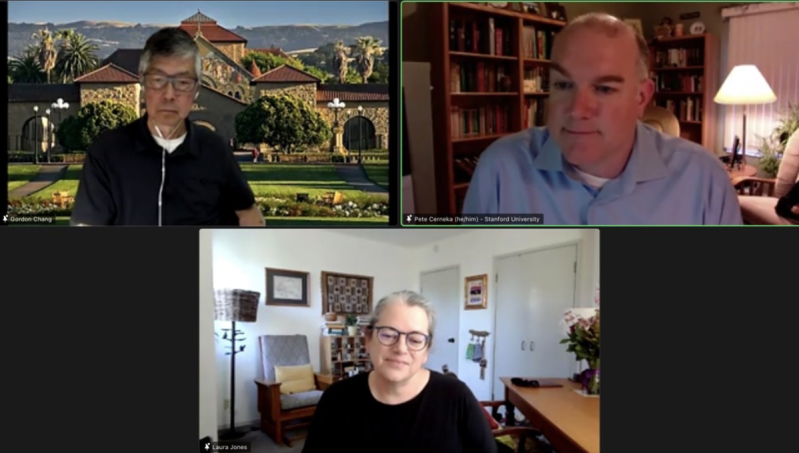University archeologist Laura Jones Ph.D. ’90 condemned Stanford’s past abuses of the indigenous Muwekma-Ohlone tribe and Chinese Americans at a Tuesday event. As Director of Stanford’s Heritage Services, Jones strives to balance the complexity of the University’s history with future initiatives.
In the past, the University has failed to educate its students and acknowledge the ways it has harmed the Muwekma-Ohlone people and Chinese Americans, according to Jones and Senior Associate Vice Provost for Undergraduate Education Gordon Chang. Jones said that when she was a Stanford graduate student in the 1980s, the university falsely claimed that the Muwekma-Ohlone tribe was extinct.
Presently, Jones leads the University’s partnership with the Muwekma-Ohlone tribe — especially in ongoing archeological projects. When speaking on her collaboration with the Muwekma-Ohlone tribe, Jones emphasized the importance of not speaking for them, but rather creating “platforms for them to speak.”
To this effect, Stanford renamed the academic Serra House, which previously honored the genocidal conquistador Junipero Serra, after the internationally renowned Native American psychologist Carolyn Lewis Attneave ’47 in 2019. When Stanford commemorated the name change, it began with the reading of a letter from the Ohlone tribe.
During the event, Chang also spoke out against the erasure of Chinese American railroad workers’ roles in building the nation’s first transcontinental railroad, from which Leland Stanford profited immensely.
To exemplify this erasure, Chang referenced the famous painting of Leland Stanford hammering in the final spike of the nation’s first transcontinental railroad. However, an actual photo of the event depicts a Chinese-American railroad worker wielding the hammer. While the real photo depicts a throng of working-class men nearly all of Chinese descent, the famous painting falsely shows a nearly all-white aristocratic cast.
This kind of erasure has consequences, according to Chang, who cites the omission of Chinese Americans from historical narratives as a cause for “the stigma Asian Americans have to bear in the sense of being perpetual aliens.”
However, both Jones and Chang praised the University’s current efforts to correct these false narratives. Jones said that there are two core aspects to the University’s decolonizing project: the administration’s long-term commitment and student advocacy. Student activism has often initiated University action, according to Jones, who cited the specific example of student activism encouraging the repatriation of Stanford’s museum collections to the Ohlone tribe in the years 1987 and 1988 — before Congress required these actions in 1990 with the Native American Graves and Repatriation Act.
Jones stressed the importance of “recognizing the difference between a meaningful sincere engagement and superficial performative political correctness.” To this end, Chang gave credit to University leadership for the multiple renaming initiatives it has undertaken.
“These are issues of not just symbolism,” Chang said. “But of removing the honor that has been given to deeply problematic people and trying to find ways to create a more inclusive society.”
As for Leland Stanford’s legacy in particular, Jones said, “I’m always looking to make sure that we’re both telling the truth about who Leland Stanford was and where his money came from, and also telling the story of his redemption, of his regret, of giving his entire fortune to the children in California.”
Jones and Chang see direct acknowledgement of Stanford’s true history with the Ohlone tribe and Chinese Americans as necessary to strengthening future relationships with their communities.
“There’s a lot of ugly moments that are not worth celebrating,” Jones said. “But it’s also important not to forget them and not to ignore them.”
